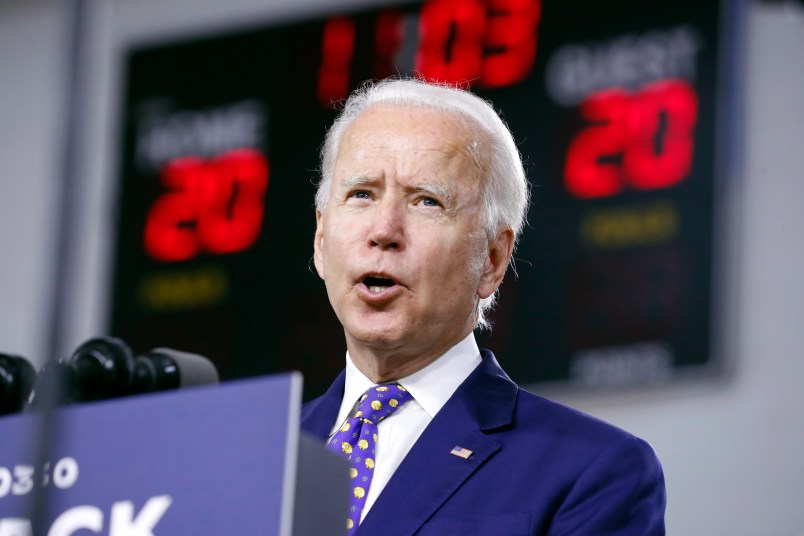WILMINGTON, Del. (AP) — Democratic presidential candidate Joe Biden promised Tuesday that his economic agenda would combat long-standing racial inequalities in U.S. society as he sought to draw another sharp contrast with President Donald Trump.
Biden said the Republican president is exacerbating social discord across the country, including by sending federal authorities into major cities under the pretense of addressing crime, and has little interest in addressing the racism that Biden said has been laid bare by the COVID-19 pandemic and an election-year reckoning with police violence against Black men.
“He’s shown that he can’t beat the pandemic and keep you safe,” Biden said, speaking in a community center gymnasium in his hometown of Wilmington, Delaware. “He can’t turn the economy around. He’s determined to stoke division and chaos. It’s not good for the country, but Donald Trump doesn’t care. His campaign is failing and he’s looking for a lifeline.”
Biden countered with a litany of proposals to steer more federal money and tax credits to various small business and economic development programs for minority-owned firms and disadvantaged neighborhoods. Biden also said he’d encourage home ownership to help close wealth gaps among minority communities.
Many of his proposals — and the billions in federal spending needed to pay for it — had already been promised as part of previous, larger Biden plans to jump-start the economy when the coronavirus outbreak begins to recede. But as protests against institutional racism and police brutality have swept the country in recent months, the presumptive Democratic presidential nominee is attempting to show voters that he’s committed to implementing specific remedies that can promote racial and economic equality should he win the White House in November.
It’s also another way for Biden to lambaste Trump, who has spent weeks vowing to restore “law and order” and ordering federal authorities to intervene against ongoing protests in places like Portland, Oregon, and Chicago, while small businesses around the country continue to struggle or shut down under economic struggles from the coronavirus.
Biden accused Trump of distracting the country and trying to scare voters by dispatching federal authorities to cities. The former vice president said most demonstrators are “peaceful protesters” who aren’t a threat to be met by federal power. “Arsonists and anarchists should be prosecuted,” Biden said, but added that “local law enforcement can do that.”
Still, Biden said “this election is not just about voting against Donald Trump. It’s about rising to this moment of crisis, understanding people’s struggle and building a future worthy of their courage and ambition to overcome.”
And he said that means thinking about every policy debate in terms of structural inequalities.
The former vice president wants to take $30 billion, or 10% of federal investment he’s already promised as part of larger economic plans, and funnel it into a “Small Business Opportunity Fund” designed to leverage $5 of private investment for minority owned enterprises for each $1 in public funds allocated. He also plans to spend $50 billion to provide startup capital that can help entrepreneurs of color start businesses in disadvantaged areas.
To encourage home ownership, the plan would create a $15,000 federal tax credit to help low-and middle-income families cover down payments on their first homes. It also pledges to build 1.5 million new homes and public housing units in hopes of addressing the affordable housing crisis that has hit many of the nation’s marquee cities and disproportionately hurt people of color.
Biden also said the Federal Reserve’s mission should be revised to specifically charge the central bank with addressing “persistent racial gaps” in economic opportunities and wealth, rather than a more general focus on maximum employment and stable pricing.
Biden similarly vowed to undo Trump administration regulatory changes that the Democratic presidential nominee says “gutted” Obama administration rules preventing housing discrimination and unfair lending practices.
Asked about the possibility of a congressional study on the feasibility of federal reparations to descendants of enslaved Black people in the United States, senior Biden officials said their candidate wouldn’t oppose such a study. But they defended Tuesday’s proposal as doing more to benefit Black Americans in the short term, saying, “He is not going to wait on a study to create change.”
Biden’s plan also doesn’t endorse legalizing marijuana, though it seeks to clear logistical court hurdles so that states can better identify nonviolent offenders whose records they might opt to expunge. Black and Hispanic Americans often face far harsher penalties for crimes involving marijuana possession than their white counterparts.
The Democratic National Committee’s convention platform committee voted by a wide margin on Monday to keep language calling for legalization of marijuana nationwide out of the party’s platform.



